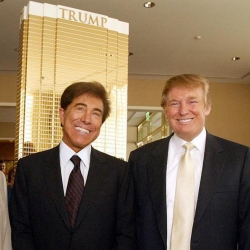
A DOJ email shows White House officials planning a meeting to lobby the Solicitor General on behalf of Steve Wynn.
The Trump White House intervened in litiagation between Wynn Resorts and the U.S. Department of Justice, according to American Oversight (AO), a left-of-center activist and litigation organization based in Washington DC. AO revealed its findings after discovering the information after a Freedom of Information (FOI) request.
Steve Wynn’s Las Vegas casino company, Wynn Resorts, had been involved in litigation with the Obama-era Justice Department over the way companies distribute tips gathered by their employees. By the summer of 2017, Steve Wynn was the Republic National Committee’s Finance chairman.
Elizabeth Brockway of The Daily Beast reports, “In the summer of 2017, the Trump White House asked for a meeting with a top official at the Department of Justice to discuss a sensitive legal and administrative matter involving a top Republican donor.”
The “top official” was acting Solicitor General Jeff Wall. It is unclear why the White House wanted to have this meeting with Jeff Wall, or whether the former US Solicititor General meet with White House officials. Both the White House and Jeff Wall declined comment when The Daily Beast contacted them.
Meeting with US Solicitor General
Jeff Wall was contacted at a time when Steve Wynn was the RNC Finance chairman, so White House intervention in the case is suspicious — if not unethical. Months after the proposed meeting, the Trump administration changed tip-pooling laws to favor management over workers.
Stephen Gillers, New York University School of Law professor who is considered an expert in legal ethics, said of the meeting, “Once there is an actual case being litigated, the norm has been that the White House stays out of it. That’s the norm. For the legal ethics point of view, the lawyers handling that case cannot allow the White House to influence their independent professional judgement on behalf of the United States.”
Wynn Resorts’ Dealer Lawsuit
A quick recap of the 12-year legal battle between Wynn Resorts and its dealers should set the background for the allegations made by American Oversight, which were made on Friday in The Daily Beast. In August 2006, Wynn Resorts’ newly announced tip pooling policy allowed the company management to pocket tens of millions of dollars meant for dealers and waitresses.
In October 2006, the Wynn dealers filed a lawsuit in Nevada state court to change the policy. The policy led the dealers to join the Transportation Workers Union of America in May 2007. By 2010, Wynn Resorts won its case, based on the argument the company had the right to include any employees it wanted in the tip pool.
Federal Regulations over Tip Pooling
The decision was reversed when the US Department of Labor passed new regulations. This led to a second lawsuit by the dealers in 2013 — this time in federal court — though US District Court in Nevada ruled the Labor Department’s regulations were beyond the federal agency’s constitutional powers.
The District Court decision was reversed in the 9th Court of Appeals in 2016. In March 2018, the US Congress passed a new law which permitted the sharing of tips with employees who do not regularly receive them, but prohibits supervisors from being a part of the tip pool. Wynn appealed their case in to the US Supreme Court in June 2018, while the dealers filed a new federal lawsuit citing the 2018 law. In October 2018, Wynn Resorts — under a new chief executive with Steve Wynn’s departure due to scandal — announced a policy change intended to head off further litigation.
Did Steve Wynn Get Inside Help?
Given the fact Steve Wynn fought 12 years to assure his management could raid his employees’ tips, it raises all kinds of questions that White House officials might have intervened in Wynn’s longstanding case. While the current Wynn Resorts board changed its policies, it brings into questions whether current and former Wynn executives knew of the White House intervention or had asked for it.
American Oversight’s FOI documents also throw into doubt Jeff Wall’s actions in the case. Professor Gillers added, “A lawyer at the Department of Justice who is approached by the White House regarding a pending matter…has to refuse to discuss it. Because that discussion cannot be allowed in any way to influence or appear to influence the decision of the Department of Justice lawyer.”
The Freedom of Information request turned up an email thread in which DOJ official Cynthia K. Shaw wrote to Scott Schools, “Jeff just received a request to meet with the White House about both the Wynn Las Vegas and National Restaurant Association cases.”
Shaw went on to request Schools give his authorization for Jeff Small to work on the Wynn case and another case involving the National Restaurant Association. But the admission that Jeff Small requires a request to meet with the White House about the Wynn Las Vegas is explicit.
Austen Evers Statement
Austen Evers, the executive director of American Oversight, said of the revelation, “During the early months of the Trump administration, it looked like Steve Wynn’s political connections were going to pay off. Whether Wynn got the advantages he was seeking or not, the records show that the Trump administration’s first instinct was to help a wealthy patron and senior official at the RNC.”
“Two years later, the episode looks like an early crack in the foundation of the rule of law.”
AO’s statement implies the rule of law is at stake. While a reasonable person can question that assertion, the DOJ emails show a clear case of cronyism. It is the kind of backroom deals which were supposed to be eliminated from “The Swamp” when the Trump Administration came to town.
